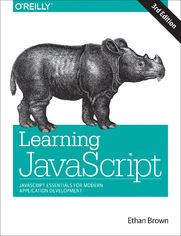Learning JavaScript. JavaScript Essentials for Modern Application Development. 3rd Edition - Helion

ISBN: 978-14-919-1492-2
stron: 358, Format: ebook
Data wydania: 2016-02-17
Księgarnia: Helion
Cena książki: 126,65 zł (poprzednio: 147,27 zł)
Oszczędzasz: 14% (-20,62 zł)
This is an exciting time to learn JavaScript. Now that the latest JavaScript specification—ECMAScript 6.0 (ES6)—has been finalized, learning how to develop high-quality applications with this language is easier and more satisfying than ever. This practical book takes programmers (amateurs and pros alike) on a no-nonsense tour of ES6, along with some related tools and techniques.
Author Ethan Brown (Web Development with Node and Express) not only guides you through simple and straightforward topics (variables, control flow, arrays), but also covers complex concepts such as functional and asynchronous programming. You’ll learn how to create powerful and responsive web applications on the client, or with Node.js on the server.
- Use ES6 today and transcompile code to portable ES5
- Translate data into a format that JavaScript can use
- Understand the basic usage and mechanics of JavaScript functions
- Explore objects and object-oriented programming
- Tackle new concepts such as iterators, generators, and proxies
- Grasp the complexities of asynchronous programming
- Work with the Document Object Model for browser-based apps
- Learn Node.js fundamentals for developing server-side applications
Osoby które kupowały "Learning JavaScript. JavaScript Essentials for Modern Application Development. 3rd Edition", wybierały także:
- Windows Media Center. Domowe centrum rozrywki 66,67 zł, (8,00 zł -88%)
- Ruby on Rails. Ćwiczenia 18,75 zł, (3,00 zł -84%)
- Efekt piaskownicy. Jak szefować żeby roboty nie zabrały ci roboty 59,50 zł, (11,90 zł -80%)
- Przywództwo w świecie VUCA. Jak być skutecznym liderem w niepewnym środowisku 58,64 zł, (12,90 zł -78%)
- Scrum. O zwinnym zarządzaniu projektami. Wydanie II rozszerzone 58,64 zł, (12,90 zł -78%)
Spis treści
Learning JavaScript. JavaScript Essentials for Modern Application Development. 3rd Edition eBook -- spis treści
- Preface
- A Brief History of JavaScript
- ES6
- Who This Book Is For
- What This Book Is Not
- Conventions Used in This Book
- Safari Books Online
- How to Contact Us
- Acknowledgments
- 1. Your First Application
- Where to Start
- The Tools
- A Comment on Comments
- Getting Started
- The JavaScript Console
- jQuery
- Drawing Graphics Primitive
- Automating Repetitive Tasks
- Handling User Input
- Hello, World
- 2. JavaScript Development Tools
- Writing ES6 Today
- ES6 Features
- Installing Git
- The Terminal
- Your Project Root
- Version Control: Git
- Package Management: npm
- Build Tools: Gulp and Grunt
- Project Structure
- The Transcompilers
- Running Babel with Gulp
- Linting
- Conclusion
- 3. Literals, Variables, Constants, and Data Types
- Variables and Constants
- Variables or Constants: Which to Use?
- Identifier Names
- Literals
- Primitive Types and Objects
- Numbers
- Strings
- Escaping
- Special Characters
- Template Strings
- Multiline Strings
- Numbers as Strings
- Booleans
- Symbols
- null and undefined
- Objects
- Number, String, and Boolean Objects
- Arrays
- Trailing Commas in Objects and Arrays
- Dates
- Regular Expressions
- Maps and Sets
- Data Type Conversion
- Converting to Numbers
- Converting to String
- Converting to Boolean
- Conclusion
- 4. Control Flow
- A Control Flow Primer
- while Loops
- Block Statements
- Whitespace
- Helper Functions
- ifelse Statement
- dowhile Loop
- for Loop
- if Statement
- Putting It All Together
- Control Flow Statements in JavaScript
- Control Flow Exceptions
- Chaining if...else Statements
- Metasyntax
- while statement
- if...else statement
- do...while statement
- for statement
- Additional for Loop Patterns
- switch Statements
- for...in loop
- for...of loop
- Useful Control Flow Patterns
- Using continue to Reduce Conditional Nesting
- Using break or return to Avoid Unnecessary Computation
- Using Value of Index After Loop Completion
- Using Descending Indexes When Modifying Lists
- Conclusion
- A Control Flow Primer
- 5. Expressions and Operators
- Operators
- Arithmetic Operators
- Operator Precedence
- Comparison Operators
- Comparing Numbers
- String Concatenation
- Logical Operators
- Truthy and Falsy Values
- AND, OR, and NOT
- Short-Circuit Evaluation
- Logical Operators with Nonboolean Operands
- Conditional Operator
- Comma Operator
- Grouping Operator
- Bitwise Operators
- typeof Operator
- void Operator
- Assignment Operators
- Destructuring Assignment
- Object and Array Operators
- Expressions in Template Strings
- Expressions and Control Flow Patterns
- Converting if...else Statements to Conditional Expressions
- Converting if Statements to Short-Circuited Logical OR Expressions
- Conclusion
- 6. Functions
- Return Values
- Calling Versus Referencing
- Function Arguments
- Do Arguments Make the Function?
- Destructuring Arguments
- Default Arguments
- Functions as Properties of Objects
- The this Keyword
- Function Expressions and Anonymous Functions
- Arrow Notation
- call, apply, and bind
- Conclusion
- 7. Scope
- Scope Versus Existence
- Lexical Versus Dynamic Scoping
- Global Scope
- Block Scope
- Variable Masking
- Functions, Closures, and Lexical Scope
- Immediately Invoked Function Expressions
- Function Scope and Hoisting
- Function Hoisting
- The Temporal Dead Zone
- Strict Mode
- Conclusion
- 8. Arrays and Array Processing
- A Review of Arrays
- Array Content Manipulation
- Adding or Removing Single Elements at the Beginning or End
- Adding Multiple Elements at the End
- Getting a Subarray
- Adding or Removing Elements at Any Position
- Cutting and Replacing Within an Array
- Filling an Array with a Specific Value
- Reversing and Sorting Arrays
- Array Searching
- The Fundamental Array Operations: map and filter
- Array Magic: reduce
- Array Methods and Deleted or Never-Defined Elements
- String Joining
- Conclusion
- 9. Objects and Object-Oriented Programming
- Property Enumeration
- for...in
- Object.keys
- Object-Oriented Programming
- Class and Instance Creation
- Dynamic Properties
- Classes Are Functions
- The Prototype
- Static Methods
- Inheritance
- Polymorphism
- Enumerating Object Properties, Revisited
- String Representation
- Multiple Inheritance, Mixins, and Interfaces
- Conclusion
- Property Enumeration
- 10. Maps and Sets
- Maps
- Weak Maps
- Sets
- Weak Sets
- Breaking the Object Habit
- 11. Exceptions and Error Handling
- The Error Object
- Exception Handling with try and catch
- Throwing Errors
- Exception Handling and the Call Stack
- try...catch...finally
- Let Exceptions Be Exceptional
- 12. Iterators and Generators
- The Iteration Protocol
- Generators
- yield Expressions and Two-Way Communication
- Generators and return
- Conclusion
- 13. Functions and the Power of Abstract Thinking
- Functions as Subroutines
- Functions as Subroutines That Return a Value
- Functions asFunctions
- So What?
- Functions Are Objects
- IIFEs and Asynchronous Code
- Function Variables
- Functions in an Array
- Pass a Function into a Function
- Return a Function from a Function
- Recursion
- Conclusion
- 14. Asynchronous Programming
- The Analogy
- Callbacks
- setInterval and clearInterval
- Scope and Asynchronous Execution
- Error-First Callbacks
- Callback Hell
- Promises
- Creating Promises
- Using Promises
- Events
- Promise Chaining
- Preventing Unsettled Promises
- Generators
- One Step Forward and Two Steps Back?
- Dont Write Your Own Generator Runner
- Exception Handling in Generator Runners
- Conclusion
- 15. Date and Time
- Dates, Time Zones, Timestamps, and the Unix Epoch
- Constructing Date Objects
- Moment.js
- A Practical Approach to Dates in JavaScript
- Constructing Dates
- Constructing Dates on the Server
- Constructing Dates in the Browser
- Transmitting Dates
- Displaying Dates
- Date Components
- Comparing Dates
- Date Arithmetic
- User-Friendly Relative Dates
- Conclusion
- 16. Math
- Formatting Numbers
- Fixed Decimals
- Exponential Notation
- Fixed Precision
- Different Bases
- Advanced Number Formatting
- Constants
- Algebraic Functions
- Exponentiation
- Logarithmic Functions
- Miscellaneous
- Pseudorandom Number Generation
- Trigonometric Functions
- Hyperbolic Functions
- Formatting Numbers
- 17. Regular Expressions
- Substring Matching and Replacing
- Constructing Regular Expressions
- Searching with Regular Expressions
- Replacing with Regular Expressions
- Input Consumption
- Alternation
- Matching HTML
- Character Sets
- Named Character Sets
- Repetition
- The Period Metacharacter and Escaping
- A True Wildcard
- Grouping
- Lazy Matches, Greedy Matches
- Backreferences
- Replacing Groups
- Function Replacements
- Anchoring
- Word Boundary Matching
- Lookaheads
- Constructing Regexes Dynamically
- Conclusion
- 18. JavaScript in the Browser
- ES5 or ES6?
- The Document Object Model
- Some Tree Terminology
- DOM Get Methods
- Querying DOM Elements
- Manipulating DOM Elements
- Creating New DOM Elements
- Styling Elements
- Data Attributes
- Events
- Event Capturing and Bubbling
- Event Categories
- Ajax
- Conclusion
- 19. jQuery
- The Almighty Dollar (Sign)
- Including jQuery
- Waiting for the DOM to Load
- jQuery-Wrapped DOM Elements
- Manipulating Elements
- Unwrapping jQuery Objects
- Ajax
- Conclusion
- 20. Node
- Node Fundamentals
- Modules
- Core Modules, File Modules, and npm Modules
- Customizing Modules with Function Modules
- Filesystem Access
- Process
- Operating System
- Child Processes
- Streams
- Web Servers
- Conclusion
- 21. Object Property Configuration and Proxies
- Accessor Properties: Getters and Setters
- Object Property Attributes
- Protecting Objects: Freezing, Sealing, and Preventing Extension
- Proxies
- Conclusion
- 22. Additional Resources
- Online Documentation
- Periodicals
- Blogs and Tutorials
- Stack Overflow
- Contributing to Open Source Projects
- Conclusion
- A. Reserved Words
- B. Operator Precedence
- Index





